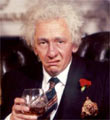
Originally Posted by
wired.com
Most of the cells in your body are not your own, nor are they even human. They are bacterial. From the invisible strands of fungi waiting to sprout between our toes, to the kilogram of bacterial matter in our guts, we are best viewed as walking "superorganisms," highly complex conglomerations of human cells, bacteria, fungi and viruses.
That's the view of scientists at Imperial College London who published a paper in Nature Biotechnology Oct. 6 describing how these microbes interact with the body. Understanding the workings of the superorganism, they say, is crucial to the development of personalized medicine and health care in the future because individuals can have very different responses to drugs, depending on their microbial fauna.
The scientists concentrated on bacteria. More than 500 different species of bacteria exist in our bodies, making up more than 100 trillion cells. Because our bodies are made of only some several trillion human cells, we are somewhat outnumbered by the aliens. It follows that most of the genes in our bodies are from bacteria, too.
Luckily for us, the bacteria are on the whole commensal, sharing our food but doing no real harm. (The word derives from the Latin meaning to share a table for dinner.) In fact, they are often beneficial: Our commensal bacteria protect us from potentially dangerous infections. They do this through close interaction with our immune systems.
"We have known for some time that many diseases are influenced by a variety of factors, including both genetics and environment, but the concept of this superorganism could have a huge impact on our understanding of disease processes," said Jeremy Nicholson, a professor of biological chemistry at Imperial College and leader of the study. He believes the approach could apply to research on insulin-resistance, heart disease, some cancers and perhaps even some neurological diseases.
Following the sequencing of the human genome, scientists quickly saw that the next step would be to show how human genes interact with environmental factors to influence the risk of developing disease, the aging process and drug action. But because environmental factors include the gene products of trillions of bacteria in the gut, they get very complex indeed. The information in the human genome itself, 3 billion base pairs long, does not help reduce the complexity.
"The human genome provides only scant information. The discovery of how microbes in the gut can influence the body's responses to disease means that we now need more research into this area," said Nicholson. "Understanding these interactions will extend human biology and medicine well beyond the human genome and help elucidate novel types of gene-environment interactions, with this knowledge ultimately leading to new approaches to the treatment of disease."
Nicholson's colleague, professor Ian Wilson from Astra Zeneca, believes the "human super-organism" concept "could have a huge impact on how we develop drugs, as individuals can have very different responses to drug metabolism and toxicity."
"The microbes can influence things such as the pH levels in the gut and the immune response, all of which can have effects on the effectiveness of drugs," Wilson said.
The Imperial College research demonstrates what many -- from X Files stalwarts to UFO fanatics -- have long claimed: We are not alone. Specifically, the human genome does not carry enough information on its own to determine key elements of our own biology.
Originally Posted by wired.com
Most of the cells in your body are not your own, nor are they even human. They are bacterial. From the invisible strands of fungi waiting to sprout between our toes, to the kilogram of bacterial matter in our guts, we are best viewed as walking "superorganisms," highly complex conglomerations of human cells, bacteria, fungi and viruses.






 Reply With Quote
Reply With Quote


 . This article to me is just another example of
. This article to me is just another example of 











Bookmarks